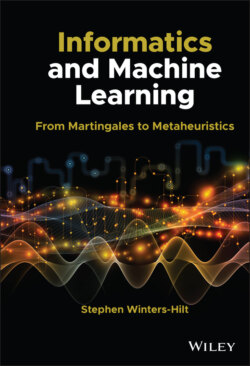Читать книгу Informatics and Machine Learning - Stephen Winters-Hilt - Страница 38
2.6.1 The Law of Large Numbers (LLN)
ОглавлениеThe LLN will now be derived in the classic “weak” form. The “strong” form is derived in the modern mathematical context of Martingales in Appendix C.1.
Let Xk be independent identically distributed (iid) copies of X, and let X be the real number “alphabet.” Let μ = E(X), σ2 = Var(X), and denote
From Chebyshev: P(| N − μ|>k) ≤ Var(N)/k2 = σ2
As N➔∞ get the LLN (weak):
If Xk are iid copies of X, for k = 1,2,…, and X is a real and finite alphabet, and μ = E(X), σ2 = Var(X), then: P(|N − μ| > k)➔0, for any k > 0. Thus, the arithmetic mean of a sequence of iid r.v.s converges to their common expectation. The weak form has convergence “in probability,” while the strong form has convergence “with probability one.”
